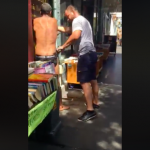Strip Searches: State-Perpetrated Sexual Acts

NSW police use of strip searches hasn’t just risen in recent times, but almost become routine. Over the four years ending in June 2018, its general use rose by 47 percent, while last year, 11 percent of persons in respect of which a drug detection dog made a positive indication were ordered to remove their clothes.
In recent months, Sniff Off has documented that officers equipped with dogs and strip search screens have been waiting for commuters on their way home from work at Central station. And reports of young people being ordered to disrobe at festivals are becoming all too common.
The data shows that in cases where this invasive technique is utilised following a drug dog indication, two-thirds of those searched won’t be carrying any illicit substances. And the vast majority of those found in possession of illegal drugs are only holding small amounts of cannabis.
And while a 1990s legal paper asserts that this practise equated to sexual assault by the state under Victorian laws of the time, today in the NSW context, these actions could be said to constitute the offence of a sexual act, which until recently was known as an act of indecency.
State-perpetrated violations
Former Essendon Community Legal Centre education worker Amanda George posits in Strip Searches Sexual Assault By the State that some “legal” strip searches would fall under the definition of sexual assault under the Crimes Act 1958 (Vic) if they were “done outside of working hours”.
George wrote that women and men were being assaulted every day by either correctional services officers or police. She explained that while the justifications for perpetrating these crimes were varied, the state labelled victims as “being of a class deserving of such treatment”.
Figures from the 1980s revealed that 70 percent of incarcerated women had been subjected to sexual abuse in the past. And George described a situation where the same department that was providing programs for the support of survivors was also routinely subjecting them to this re-traumatising act.
In 2017, Victorian Ombudsman Deborah Glass recommended that her state’s gaols stop strip searching women inmates as part of contact visits. And last October, she reported this had been done, adding that the searches can “inflict further trauma” on those who’ve previously been abused.
Re-experiencing past trauma
“It is a form assault,” RMIT criminology and justice studies lecturer Dr Peta Malins remarked. “When the state uses that kind of violence, it needs to be well justified and subject to really strict protections for people.”
Dr Malins recently released her study Drug Dog Affects, in which she documents the damaging effects police use of drug detection dogs is having on communities. She notes that these operations actually increase drug harms and traumatise victims.
The doctor interviewed 22 people who’d been subjected to a drug dog search. One woman, who was also strip searched, had been assaulted in the past and found the search to be “particularly traumatising”, reporting that it had a “huge impact on her life”.
“At the moment, the strip searches that are happening across these operations, don’t have anywhere near the kind of level of legal justification and protections that they should have,” Dr Malins told Sydney Criminal Lawyers.
Sexual acts without consent
On the occasions when police are standing on platforms accompanied by drug dogs at Central station on peak hour, those for which a dog gives a positive indication are taken behind a screen, ordered to remove clothing and searched, often against their will.
If a civilian were to engage in a similar act against another, the crime they’d be committing would be a sexual act, which was formerly known as an act of indecency prior to last December.
Section 61KE of the Crimes Act 1900 (NSW) stipulates that an individual who carries out a sexual act towards another without their consent is liable to up to 18 months in prison. Section 61HC defines a sexual act as an act – other than touching – that a reasonable person would consider sexual.
Police carry out strip searches in pairs. If two civilians perpetrated this act together, it would mean it was committed “in company”. Under section 61KF of the Crimes Act, this constitutes an aggravated sexual act, which carries a maximum 3 year prison sentence.
Sexual touching
There have also been a number of reports and indeed video footage of police officers illegally touching those they are strip-searching, including beneath their underwear, which could amount to the crime of sexual touching under NSW law, which was previously known as indecent assault
Sexual touching is an offence under section 61KC of the Crimes Act which carries a maximum penalty of 5 years in prison, or 7 years where it is aggravated by the act being committed in the company of at least one other person.
Never give consent
Part 4 division 4 of the Law Enforcement (Powers and Responsibilities Act) 2002 (NSW) (the LEPRA) sets out the strip search powers police have. Section 31 states that a strip search can only be conducted when “the seriousness and urgency of the circumstances” necessitate it.
Section 33 of the LEPRA outlines that these searches must be carried out in an enclosed area and not in view of anybody of the opposite sex. Body cavities can’t be checked. The search shouldn’t involve the removal of any clothing unnecessarily and an officer should never touch an individual.
A refusal to comply with armed officers’ orders to strip down is taken as being motivated by having something to hide – rather than having anything to do with fear, dignity or humiliation – so it’s best to politely comply with instructions.
However, an individual should never give consent to being searched: reason being, if it’s found the search was carried out illegally, then having given consent actually overrides that finding and makes it legal.
Lacking awareness and accountability
A number of recent social media posts have revealed incidents where seemingly undertrained officers have breached strip search protocols. The Redfern Legal Centre’s Safe and Sound campaign aims to have the legislation’s “vague and legalistic” wording altered to avoid misunderstandings.
NSW Greens MLC David Shoebridge said last week that his office’s initial review of police standard operating procedures and training “ suggests that police are not advised as to how traumatic strip searches can be, especially on young women”.
Dr Malins stressed that strip searches can be experienced as a sexual violation, explaining that the woman she spoke to definitely experienced it that way. And the doctor emphasised there needs “to be far greater protections and justifications for any sort of violence from the state”.








